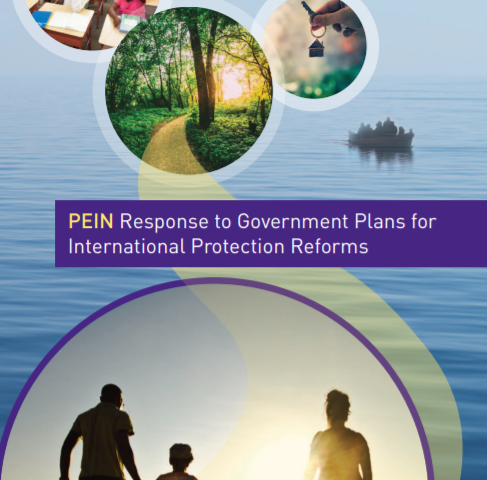PEIN Response to Government Plans for International Protection Reforms

Summary
The Prevention and Early Intervention Network (PEIN) joins with our many colleagues in
welcoming the Programme for Government commitment to end Direct Provision, the
conclusion of the recent Advisory Committee that the current Direct Provision system is ‘not
fit for purpose’, (Government of Ireland, 2020: 10), and the publication of a Government
White Paper on ending Direct Provision. Further, we welcome the recent announcement of
the independent Oversight Group established to monitor progress of the implementation of
the White Paper.
The Prevention and Early Intervention Network (PEIN) is a membership organisation
representing individuals and organisations working with children and families in Ireland who
believe that policies and services need to enhance their commitment to proven prevention
and early intervention approaches. This is particularly the case for services working with
children and families facing adversity and disadvantage. PEIN particularly welcomes the
focus on service provision by the state and not-for-profit sectors and the proposal that
Children and Young People’s Services Committees (CYPSCs) will provide a key planning and
communication function. The introduction of well-being indicators is also a very positive
development, as is the proposal to establish a fund for the community and voluntary sector to
support those seeking International Protection (IP).
In addition to the Report of the Advisory Group on the Provision of Support, Including
Accommodation, to Persons in the International Protection Process (Day, 2020), the
Ombudsman for Children’s Office (OCO) published a report earlier this year which concluded
that Direct Provision (DP) ‘does not have the best interests of children, or the protection and
promotion of the human rights of child refugees at its core’ (Ombudsman for Children’s
Office, 2021: 5).
This report also notes many significant recommendations from a 2015 report by Dr Bryan
McMahon which remain to be implemented, such as the establishment of an independent
complaints process. Of particular interest to PEIN is the Ombudsman’s statement that the
‘HSE, Tusla and IPAS (International Protection and Accommodation Service) have failed to
collaborate to provide on-site, preventative and early intervention services and to gather
data on national trends of referral to services’, (ibid: 6).
This too was a recommendation in the McMahon report. The Children’s Rights Alliance
statement to the Joint Committee on Justice and Equality (June 2019) also highlighted the
need for a ‘detailed strategy to focus on prevention and early intervention measures to
support children and families living in Direct Provision incorporating the Signs of Safety
approach and……link with local and community services’, (CRA, 2019).
